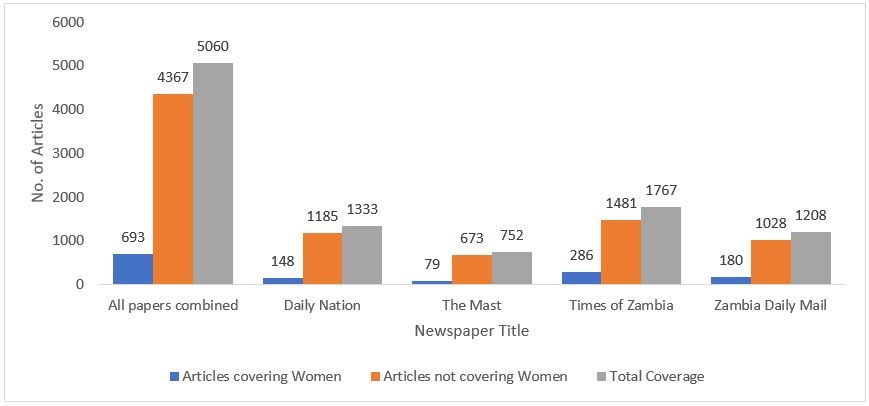
Zambian women marginalised in media coverage
Lusaka, 10 May 2017:
Women in Zambia are grossly marginalised and their voices underplayed in the media’s coverage of national issues, a Panos Institute Southern Africa (PSAf) study has established.
PSAf is currently conducting a monthly content analysis of the coverage of women by Zambia’s four leading daily newspapers – The Mast, Times of Zambia, Daily Nation and Zambia Daily Mail. This is part of the Women Empowered for Leadership project which PSAf is implementing with financial support from Hivos Southern Africa.
PSAf analysed all the newspapers published in the month of December and the findings show that women were poorly covered. As shown in Figure 1 below, out of a total of 5,060 articles published in December 2016 in the four leading newspapers, only 693 were on women. This means women received a paltry 13.7% of all coverage in the leading papers, while 86.3% of coverage was dedicated to men and other stories not related to women. An analysis of the coverage by paper shows that the Times of Zambia and the Zambia Daily Mail newspapers gave a better percentage of coverage to women at 16.2% and 15% respectively, while Daily Nation and Mast had much less coverage of women standing at 11.1% and 10.5% respectively.

Figure 1: Summary of the findings in terms of quantity of coverage of women compared to total coverage
Considering that the four newspapers are the most widely distributed and read in the country, these findings present an unpleasant picture. The findings show that Zambians are deprived information about women’s participation in leadership, and this limits the extent to which consumers of media content can embrace women leadership.
Based on these findings, PSAf has started engaging interested journalists from mainstream and community media houses to produce content promoting women’s participation in leadership. PSAf is supporting the journalists with fellowships to produce content that would promote positive public images of women, build the credibility of women as leaders, and mobilise their audiences to support women’s participation in leadership.
PSAf is also using the study findings to lobby media bodies, journalists, editors, policy makers and civil society to promote positive profiling of women as a tool for advancing women empowerment for leadership. We have no doubt that these findings provide a solid foundation on which we can all tackle the overt marginalisation of women by the media.
Issued by:
Lilian Saka-Kiefer
Executive Director, Panos Institute Southern Africa (PSAf)
Email: general@panos.org.zm, Tel: +260978778148/9